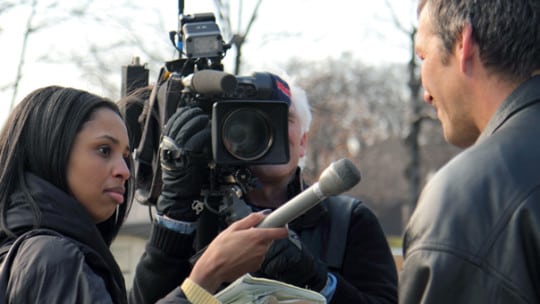
As a local and network news reporter, I conducted thousands of interviews over nearly two decades. Yet it was only after I made the leap into strategic and crisis communications that I fully appreciated the complex dynamic at play.
As a reporter, it never occurred to me how vital media training could be for leaders in corporate America, the nonprofit world, higher education or any public-facing organization. Having now counseled dozens of clients on myriad delicate and high-profile issues, I’m convinced that no responsible spokesperson should speak to a journalist without: (A) a clearly articulated and vetted set of messages and (B) feeling comfortable and confident in delivering those messages.
Public perception is that the interviewer is playing offense while the interviewee is on defense. That should never be the mindset of the individual being interviewed, however. As former Secretary of State Henry Kissinger quipped to the media, “What questions do you have for my answers today?” Kissinger had a job to do: deliver the administration’s talking points, and regardless of what was asked, he was going to do it. Similarly, the spokesperson has a job and should think of himself as playing offense: proactively pushing out key talking points, even if it’s in the context of answering a reporter’s question.

Having a firm grasp of messages is one way to remain on point during an interview. Still, there are techniques reporters utilize to try and get the answers they seek. By sharing some of the methods I used as a reporter, I hope you can avoid missteps and take advantage of key opportunities to ensure your next interview is successful.
•EXPECT a reporter to use small talk to try and get you to let down your guard. Nothing is wrong with a little polite chitchat, just never lose sight of the task at hand. The reporter is not your friend, and, especially during a crisis, you must maintain your guard. Expect anything you say to be quoted, even if the video camera or voice recorder isn’t rolling.
•EXPECT a reporter to ask the same question in many different ways. Recognize that if reporters don’t get what they want the first time, they will ask the same question again, phrasing it differently. It’s not incumbent upon you, the interviewee, however, to answer differently.
•EXPECTa reporter to begin a question with “Some might say…” Realize that when this occurs, you have every right to ask who “they” are. Do not accept the premise of a question if you believe it’s based on faulty information or data. You are allowed to ask questions if it helps you better understand exactly what is being asked.
•EXPECTa reporter to invade your space. This can be jarring for many doing their first interview. Alternatively, you might be in a remote location and not see the reporter who’s interviewing you.
•EXPECT the reporter will try to use silence against you. The more you talk, the more you’re likely to say something you regret. Don’t feel like you need to fill the silence in between finishing your answer and the next question just to be polite.
•EXPECT a negative question and know how you will answer. Never repeat a negative question in your answer. If asked, “Isn’t it true that your organization is guilty of mismanagement?” do not answer, “It isn’t true that our organization is guilty of mismanagement.” Instead, the answer should be something like, “Our organization has been managed properly at all times.”
•EXPECT a question you shouldn’t answer and yet never say “no comment.” There always is something you can say. When the public hears “no comment” typically there is an assumption of guilt. That’s why media training and having your key messages down cold are crucial. Anticipate tough questions and consult with legal counsel, if necessary, to determine what answers are acceptable and won’t expose your organization to liability (if the issue is particularly volatile).
•EXPECT that a reporter will end an interview with “Is there anything else?” When it happens, seize the opportunity, even if it’s restating your key messages.
Good reporters do their homework. Spokespeople should, too. Having media training from professional communicators is a key component to ensure that your organization’s reputation remains intact.
4 Tips to Better Understand Reporters’ Thinking
- Reporters feel entitled to receive information. Dodging a reporter’s inquiry is rarely a smart move. If they leave a message call them back and ask what they want to talk about and the angle they are taking. Even if it’s only a brief written statement, it will likely satisfy the reporter’s need for a response. It’s better than seeing a “no comment.”
- Reporters have limited time to absorb and digest information. Know this and plan for how you will get your most important points across at the beginning of the interview in succinct and potent sound bites.
- Reporters often need education about your subject matter. Take a few minutes before the interview to provide background, especially if it involves a complex topic.
- Reporters may use flawed information just to present the other side. Ask reporters whom they are talking to and provide context or specific examples of where the other side has mistakenly or intentionally misled others. This will help establish you as the more reliable source in reporters’ mind and will influence how they write their story.
CONTACT: [email protected]
This article originally appeared in the April 25, 2016 issue of PR News. Read more subscriber-only content by becoming a PR News subscriber today.
